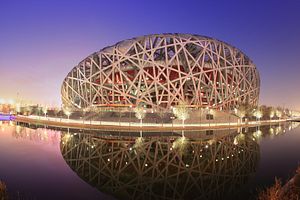The International Olympic Committee (IOC) is in Beijing this week, evaluating the Chinese capital’s bid to host the 2022 Winter Olympics. If successful, Beijing would become the first city to host both the Summer and the Winter Olympics – and a mere 14 years apart, to boot.
Beijing is viewed by many as a heavy favorite to win the games. Its only rival in the bidding process, Almaty, Kazakhstan, has its own issues to sort through – including a question mark about the government’s capability to host a major global event.
However, China is also well aware of the factors working against its bid. Some of these potential stumbling blocks are out of Beijing’s control – including the fact that the IOC may be reluctant to schedule three games in a row in Northeast Asia (with the 2018 Winter Games already set for Pyeongchang, South Korea and the 2020 Summer Games to be held in Tokyo). There’s also the unavoidable fact that Beijing simply doesn’t receive much snow – and that some skiing areas will be by necessity 150 miles from Beijing.
But there’s one major issue that Beijing hopes to be able to deal with: smog. China’s air pollution was a major question mark leading into the 2008 Summer Olympics; the capital was able to ensure clean skies through a temporary fix, shutting down factories and removing cars from the roads (much like its strategy for ensuring “APEC Blue” last November).
The winter, however, is a far more challenging time for Beijing lungs. Smog from coal soars as buildings turn up the heat. February, when the Winter Olympics are normally held, is actually the worst month for air pollution in Beijing (August, the month of the 2008 games, actually sees some of the best air quality for Beijing).
It’s no surprise that Beijing is promising to (literally) clean up its acts before 2022. “Beijing’s odds of winning [the 2022 Games] have increased substantially, save one crucial detail — the notorious smog enveloping the city,” a commentary in Xinhua warned.
Promises of cleaner air will certainly help Beijing’s bid, but more importantly it also in well with promises made from the Chinese government to its own people, including during the recently concluded National People’s Congress. While many experts in China predict its megacities won’t see blue skies consistently until 2030, leaders are hinting they could speed up the timetable if the 2022 Olympic Games provided an extra incentive.
Lyu Xinhua, the spokesman for the Chinese People’s Political Consultative Conference National Committee, said Beijing would do its utmost to ensure “Olympic Blue” if its bid is successful. That, in turn, would “benefit the 100 million residents in the Beijing-Tianjin-Hebei region,” Xinhua noted.
Wang Hui, the deputy secretary general of Beijing’s bid committee told journalists that the city would spend 40 billion RMB ($6.4 billion) to combat air pollution. “Bidding for the Olympics will help us tackle air pollution, while fighting air pollution can also help the bidding process,” Wang said.
Beijing’s major, Wang Anshun, even made the ambitious promise that Beijing’s “air quality will meet World Health Organization standards by the start of the winter of 2022.” The WHO considers anything over 25 micrograms per cubic meter unhealthy and recommends no more than 10 micrograms per cubic meter for “long-term exposure.” Currently, Beijing’s average level of PM2.5 pollution is 85.9 micrograms per cubic meter.
The IOC will determine the host of the 2022 games on July 31 of this year, at an election to be held in Kuala Lumpur, Malaysia.
































